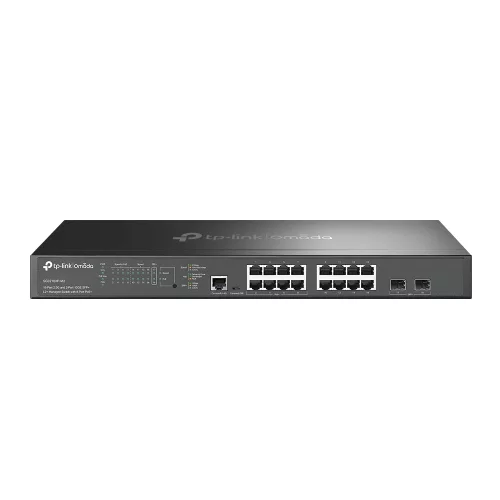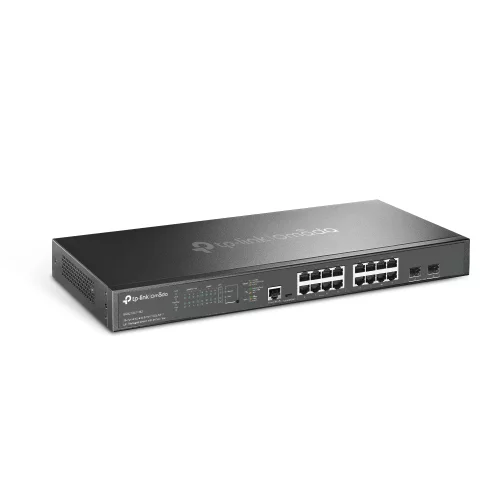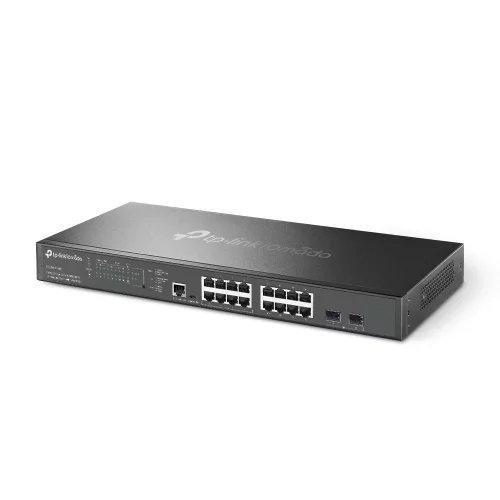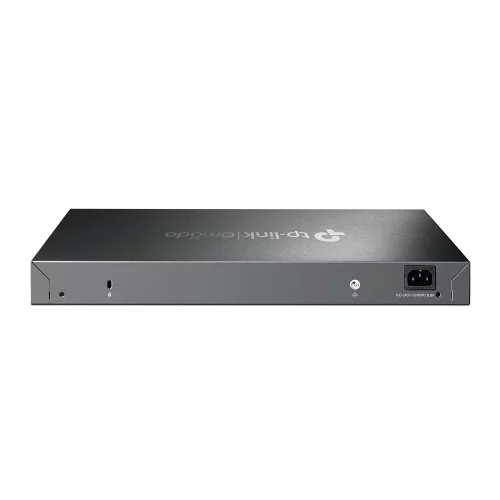TP-Link Omada SG3218XP-M2 16-Port 2.5G Switch and 2-Port 10GE SFP+ L2+ Managed with 8-Port PoE+
- 2.5G Ports for WiFi 7/6E/6 : 8 × 2.5 Gbps PoE+ ports and 8 × 2.5 Gbps non-PoE ports break the 2.5G barrier and unlock the full potential of WiFi 7/6E/6 AP.
- 10G Lightning Fast Uplink: 2 × 10 Gbps SFP+ slots enable high-bandwidth connectivity and non-blocking switching capacity.
- 240 W PoE Budget : 8 × 802.3at/af-compliant PoE+ ports with a total power of 240W*.
- Integrated with Omada SDN: Zero-Touch Provisioning (ZTP)**, centralized cloud management and intelligent monitoring
- Centralized management: Cloud access and Omada app for extreme convenience and easy management.
- Static routing: Helps route internal traffic for more efficient use of network resources.
- Stable security strategies: IP-MAC-port binding, ACL, port protection, DoS Defend, Storm control, DHCP Snooping, 802.1X, Radius Authentication, etc.
- Optimize voice and video applications: L2/L3/L4 QoS and IGMP snooping.
Featuring 8x PoE+ 2.5G ports, the switch is capable of future network expansion and deployment, providing sufficient bandwidth for incoming WiFi 7/6E/6 APs. Designed to use a single Ethernet cable for both data and power transmission, it supports up to 240W total PoE power budget* and flexible installation to fit a variety of application scenarios.
2 × 10 Gbps SFP+ slots provide non-blocking switching performance and ultra-low latency, so reliable and lightning-fast connections to servers and other switches are easily built.
Omada's Software-Defined Network (SDN) platform integrates network devices, including access points, switches, and gateways, providing 100% centralized cloud management. Omada creates a highly scalable network - all controlled from a single interface. Seamless wireless and wired connections are provided, ideal for use in hospitality, education, retail, offices, and more.
Product features:
| Interface | 16 × 2.5 Gbps RJ45 ports 2 × 10G SFP+ slots 1 × RJ45 console port 1 × Micro-USB console port |
|---|---|
| Number of fans | 2 |
| Power supply | 100-240 V AC~50/60 Hz |
| PoE ports (RJ45) | Standard: 802.3at/af compatible PoE+ ports (802.3at PoE): 8 ports, up to 30 W per port Power budget: 240 W |
| Dimensions (W x D x H ) | 17.3 × 7.1 × 1.7 inches (440 × 180 × 44 mm) |
| Mounting | Can be mounted in a trunk |
| Max. power consumption | 299.4 W (110V/60Hz) (with 240 W PD connected) |
| Maximum heat dissipation | 1021.64 BTU/h (110 V/60 Hz) (with 240 W PD connected) |
| Switching capacity | 120 Gbps |
| Packet data rate | 89.28 Mpps |
| MAC address table | 16 K |
| Packet buffer memory | 12 Mbit |
| Jumbo Frame | 9 KB |
| Quality of Service | 8 Priority Queues 802.1p CoS/DSCP Priority Queue Schedule - SP (Strict Priority) - WRR (Weighted Round-Round Mode) - SP+WRR Bandwidth Control - Port/Flow Rate Limiting Smoother Performance Flow Action - Mirror (to supported interface) - Forward (to supported interface) - Rate Limiting - QoS Note |
| L3 Features | 32 IPv4/IPv6 Interfaces Static Routing - 48 static routes Static ARP - 128 static entries Proxy ARP Gratuitous ARP DHCP Server DHCP Relay - DHCP Interface Relay - DHCP VLAN Relay DHCP L2 Relay |
| L2 and L2+ Features | Link Aggregation - Static Link Aggregation - 802.3ad LACP - Up to 8 aggregation groups containing 8 ports per group Spanning Tree Protocol - 802.1d STP - 802.1w RSTP - 802.1s MSTP - STP Security: TC Protect, BPDU Filter, Root Protection Loopback Detection - Port Based - VLAN Based Flow control - 802.3x Flow Control - HOL Blocking Prevention Mirroring - Port Mirroring - CPU Mirroring - One-to-One - Many-to-One - Tx/Rx/Both |
| L2 multicast | IGMP Snooping - IGMP v1/v2/v3 Snooping - Fast Leave - IGMP Snooping Querier - IGMP Authentication IGMP Authentication MLD Snooping - MLD v1/v2 Snooping - Fast Leave - MLD Snooping Querier - Static group configuration - Limited IP multicast MVR Multicast filtering: 256 profile and 16 profile entries |
| Advanced Features | Automatic Device Discovery Batch Configuration Batch Firmware Upgrade Intelligent Network Monitoring Unusual Event Alerts Unified Configuration Restart Schedule |
| VLAN | VLAN Group< br /> - Max 4K VLAN groups 802.1Q tagged VLAN MAC VLAN: 256 entries Protocol VLAN: Protocol Template 16, Protocol VLAN 16 GVRP VLAN VPN (QinQ) - Port-based QinQ - Selective QinQ Voice VLAN |
| Access Control List | Time-Based ACL MAC ACL - Source MAC - Destination MAC - VLAN ID< br /> - User Priority - Ether Type IP ACL - Source IP - Destination IP - Fragment - IP Protocol - TCP flag - TCP/UDP port - DSCP/IP TOS - User priority Combined ACL Packet content ACL IPv6 ACL Policy - Mirroring - Forwarding - Rate Limiting - QoS Note ACL applied to port/VLAN |
| Protection | IP-MAC-Port Binding - 512 Entries - DHCP Snooping - ARP Inspection - IPv4 Source Guard: 100 entries IPv6-MAC-Port Binding - 512 Entries - DHCPv6 Snooping - ND Detection - IPv6 Source Guard: 100 entries DoS Defend Static/Dynamic Port Security< br /> - Up to 64 MAC addresses per port Broadcast/Multicast/Unicast Storm Control - kbps/rate control mode 802.1X - Basic port authentication - Mac Basic Authentication - VLAN Assignment - MAB - Guest VLAN - Supports Radius Authentication and Accountability AAA (including TACACS+) Port Isolation Secure web management via HTTPS with SSLv3/TLS 1.2 Secure command line interface (CLI) management with SSHv1/SSHv2 IP/port based/ MAC Access Control |
| IPv6 | IPv6 Dual IPv4/IPv6 Multicast Listener Discovery (MLD) Snooping IPv6 ACL IPv6 Interface Static IPv6 Routing IPv6 Neighbor Discovery (ND) Maximum Transmission Unit (MTU) Discovery Internet Control Message Protocol (ICMP) version 6 TCPv6/UDPv6 IPv6 applications - DHCPv6 client - Ping6 - Tracert6 - Telnet (v6) - IPv6 SNMP - IPv6 SSH - IPv6 SSL - Http/Https - IPv6 TFTP |
| MIB | MIB II (RFC1213) Interface MIB (RFC2233) Ethernet Interface MIB (RFC1643) Bridge MIB (RFC1493) P/Q-Bridge MIB (RFC2674) RMON MIB (RFC2819) RMON2 MIB (RFC2021) Radius Reporting Client MIB (RFC2620) Radius Authentication Client MIB (RFC2618) Remote Ping, Traceroute MIB (RFC2925) TP-Link private support MIB |
| Own the app | yes Requirement to use OC300, OC200, Omada Cloud-Based Controller or Omada Software Controller. |
| Centralized Management | Omada Cloud Controller Omada Hardware Controller (OC300) Omada Hardware Controller (OC200) Omada Software Controller |
| Cloud Access | yes Requires use of OC300, OC200, Omada Cloud-Based Controller or Omada Software Controller. |
| yes Requires use of Omada Cloud-Based Controller. | |
| Management Features | Web-based GUI Command Line Interface (CLI) via console port, telnet SNMP v1/v2c/v3 - Trap/Inform - RMON (1,2,3,9 groups) SDM template DHCP/BOOTP Client 802.1ab LLDP/LLDP-MED DHCP Auto-Install Dual Image, Dual Configuration CPU Monitoring Cable Diagnostics EEE Password Recovery SNTP System Log |
| Certificates | CE, FCC, RoHS |
| Package Contents | SG3218XP-M2 Switch Power Cord Quick Installation Guide Rack Mount Kit Rubber Feet |
| System Requirements | Microsoft® Windows® 98SE, NT, 2000, XP, Vista™ or Windows 7/8/10/11, MAC® OS, NetWare®, UNIX® or Linux. |
| Environment | Operating temperature: 0–50 ℃ (32–122 ℉); Storage temperature: -40–70 ℃ (-40–158 ℉) Operating humidity: 10–90% RH non-condensing Storage humidity: 5–90% RH non-condensing |
| Warranty | 60 months |
*PoE budget calculations are based on laboratory testing. Actual PoE power budget is not guaranteed and will vary due to customer constraints and environmental factors.
**Zero-touch provisioning requires the use of Omada Cloud-Based Controller. Please go to Omada Cloud-Based Controller Product List to find all models supported by Omada Cloud-Based Controller.
***ISP features can only be configured in standalone mode.










